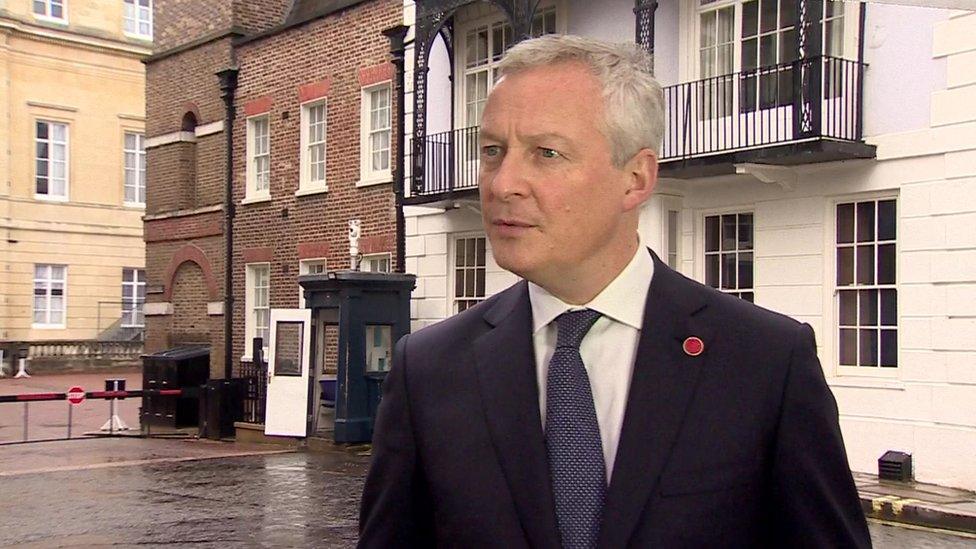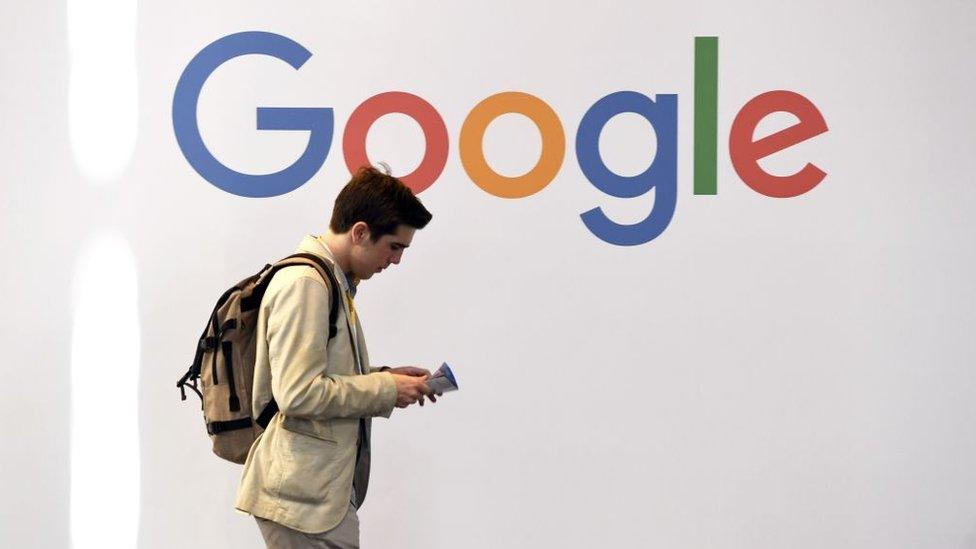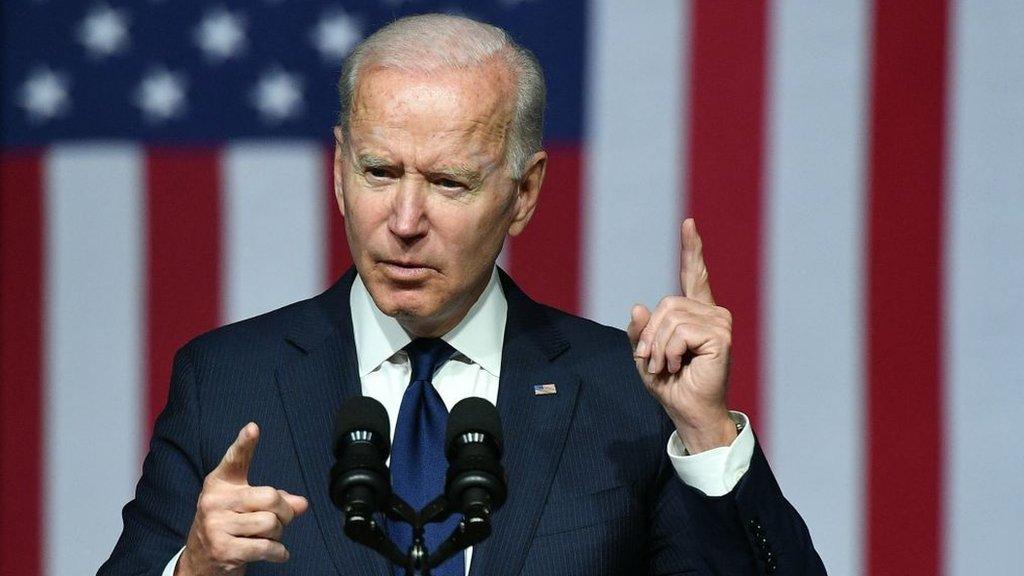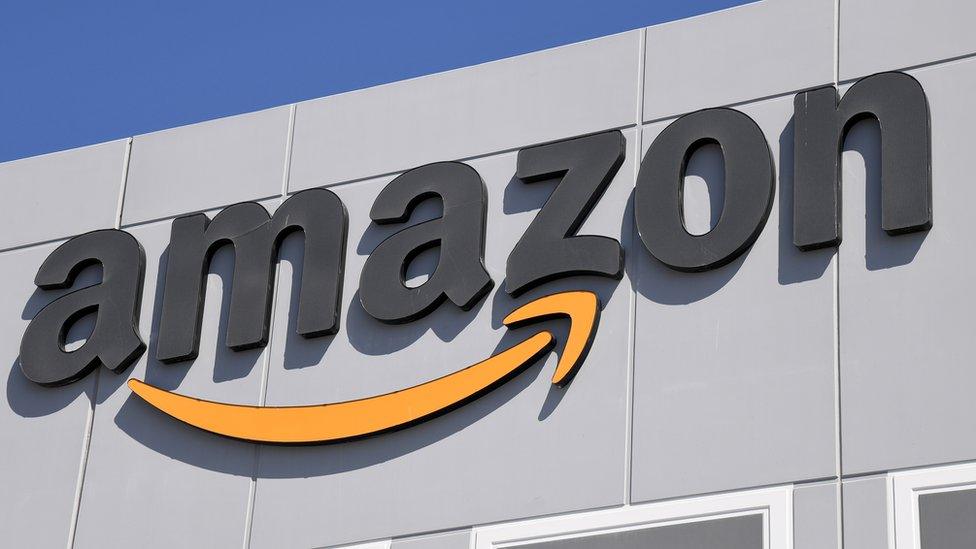Rich nations 'millimetre away' from tech tax deal
- Published
- comments
G7: 'I believe we can make significant progress' - Sunak
A global agreement to end the "race to the bottom" on corporate taxation is within sight, according to the French and German finance ministers.
France's Bruno le Maire told the BBC the G7 club of rich nations were "just one millimetre away from a historic agreement" on a global minimum rate.
He urged low tax states like Ireland to back a deal which would target tech giants such as Amazon and Microsoft.
The German finance minister said a 15% rate would help pay back Covid debt
Tax on big tech and multi-nationals has been a source of friction between the US and fellow G7 countries such as the UK.
German finance minister Olaf Scholz said it was important to stop the world's biggest companies from dodging tax.
He said it was "absolutely necessary" to reach a deal in order to "get out of this race to the bottom we see with taxes today…especially after the Covid crisis and all the money we spent to defend the health of the people, and to defend the economy."

French finance minister Bruno le Maire told the BBC any deal must include both a tech tax on digital activities as well as a minimum rate
Mr Le Maire also urged Ireland, which has one of the lowest corporate tax rates in the European Union, at 12.5%, to get "on board".
He added: "European countries, that in the past, opposed this new international tax system, must understand that they have to give the agreement to this major breakthrough".
'Starting points and sticking points'
Both ministers said agreement on a minimum rate remained a sticking point.
Mr Le Maire said he saw the 15% rate as a "starting point".
He said: "If it can be higher, it is better to have a higher rate than 15%."
However, Mr Scholz suggested that 15% would be an effective starting point that would mark a "turning point" after years of going in the other direction.
It came after UK Chancellor Rishi Sunak says he was "confident" of reaching a global agreement on digital taxation ahead of a meeting of world finance leaders.
Finance minsters will also discuss climate change at the two day meeting which starts in London on Friday.
Ahead of the G7 talks, starting in London on Friday, Mr Le Maire and Mr Scholz along with their counterparts in Italy and Spain co-signed a letter urging an agreement on an international tax system "fit for the 21st Century".
In a letter to The Guardian, external, they wrote: "Introducing this fairer and more efficient international tax system was already a priority before the current economic crisis, and it will be all the more necessary coming out of it."


Those attending the G7 finance ministers summit are certain that a deal will be done on global taxation by Saturday morning - and they are not shy about its "historic nature". Mr Scholz told me they'll "have an agreement which will really change the world... this will be a turning point in global co-operation".
Another finance minister said privately the deal will start to set the rules for the 21st Century, because if the Western G7 democracies were incapable of doing it, then China would.
The UK's turnaround on minimum tax rates is quite something. Successive elections have been fought on the danger of corporation tax hikes to jobs and investment. Now, not only is that policy, but the UK looks set up to have overseen an agreement to limit the extent to which a future chancellor could cut it.
There are two sticking points, sources tell me. Firstly, there is the mention (or not) of a global minimum corporation tax rate of 15%. There is also a move to use the wording "at least 15%" to show some ambition - but also to provide some negotiation space at the wider G20 meeting chaired by Italy and including the likes of China and Russia.
The US also asked countries that have levied digital taxes - France, Italy and the UK, to withdraw them quickly as part of the deal. At least one finance minister said that was a "non-starter", as it could immediately result in the big tech giants paying less, not more tax.
The end result will depend on fine detail, but looks likely to involve a new ability to charge 100 or so of the world's largest companies based on where their sales are, not where they house the factories or patents and trademarks.
This could be transformative, and not just for Big Tech, but some more conventional multinationals.

Tax tech
On Wednesday, the US announced it would impose tariffs on about $2bn (£1.4bn) of imports, including certain goods from the UK, in retaliation for taxes on big US tech firms.
However, it suspended them for 180 days to allow further talks to take place in London and at a meeting of G20 nations in July.
Mr Sunak is expected to push for an agreement on taxes and call for all global businesses to commit to climate reporting.
Speaking ahead of the G7 meeting, Mr Sunak said: "Securing a global agreement on digital taxation has also been a key priority this year - we want companies to pay the right amount of tax in the right place, and I hope we can reach a fair deal with our partners.
"I'm determined we work together and unite to tackle the world's most pressing economic challenges - and I'm hugely optimistic that we will deliver some concrete outcomes this weekend."

Governments have become increasingly concerned about the amount of tax paid by US tech giants.
The ministers will be looking at how to stop the likes of Google, Amazon, Starbucks and Apple paying low or no taxes in countries where they generate revenues.
The meeting is being held as it emerged that an Irish subsidiary of US technology giant Microsoft paid no corporation tax on $315bn in profit it made last year, according to The Guardian, external.
Microsoft Round Island One is resident in Bermuda and the profit it generated last year is equal to nearly three-quarters of Ireland's GDP.
Microsoft said this was due to "a one-time event and reflects an inter-company reorganisation, not a cash gain".
"Our organisational and tax structure reflects our complex global business. We are fully compliant with all local laws and regulations in the countries where we operate," a spokesperson added.
All G7 countries, bar the UK, have supported a proposal from the US for a global minimum corporate tax rate of 15% that could raise $50-$80bn for governments around the world.
'Deal within reach'
Germany, France, Italy and Spain said the commitment to a minimum 15% tax rate is "a promising start" but said G7 nations must reach "a common position on a new international tax system" in London before more nations meet next month.
They wrote, external: "We are confident it will create the momentum needed to reach a global agreement at the G20 in Venice in July. It is within our reach. Let's make sure it happens. We owe it to our citizens."
The UK is holding out for reassurances about the Digital Services Tax, which levies 2% on revenues derived in the UK from online marketplaces, search engines and social media platforms.
It is open to the idea of a global corporate minimum tax rate and is said to be prepared to let the Digital Services Tax go if it obtains assurances that big tech will not simply be let off the hook.
The Biden administration initially pushed for a global minimum corporate tax rate of 21% but has now retreated to 15%. However, officials have said that's regarded very much as a "floor".
Finance ministers from the US, Japan, France, Canada, Germany and Italy will be attending the meeting at Lancaster House, along with representatives from the European Commission, the Eurogroup, the World Bank, the International Monetary Fund and the Organisation for Economic Co-operation and Development.
Related topics
- Published2 June 2021

- Published12 May 2021
